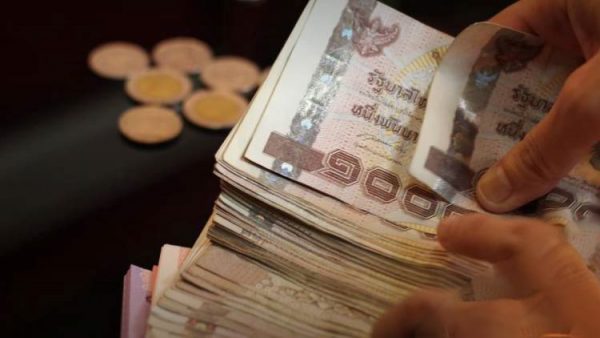Government finds itself backed into a corner on digital wallet scheme

The Thai government’s controversial plan to raise 500 billion baht through an off-budget loan for the digital wallet scheme has run into another roadblock.
The National Anti-Corruption Commission (NACC) recently issued a warning that the scheme risked violating the Constitution and related laws and was vulnerable to corruption.
In January, the Council of State — the government’s legal advisory body — had also suggested thorough consultation with related agencies, and asked that the State Fiscal and Financial Disciplines Act be followed before proposing a loan bill to Parliament.
A hot potato
In the run-up to the May general election last year, the Pheu Thai Party had pledged to implement the digital wallet scheme under which everyone aged 16 years and above would be given a one-time 10,000 baht handout for spending in a prescribed radius within six months.
The estimated cost of the scheme was around 560 billion baht.
Pheu Thai, which leads the current ruling coalition had argued then that the scheme was aimed at boosting the country’s faltering economic growth to at least 5 per cent. Economic growth in recent years has been stuck in a rut of 2-3 per cent.
The handout plan has come under fire from economists and some former central bank governors who say it would be fiscally irresponsible and fuel inflation.
Following the criticism, Pheu Thai gave it fresh thought and modified the scheme.
In November, the government revised the eligibility criteria and excluded those having monthly income of 70,000 baht and above, as well as those having bank deposits of 500,000 baht and above.
This reduced the number of people eligible for the handouts to 50 million from 54 million, lowering the estimated cost to around 500 billion baht from 560 billion baht.
The revision did not change the opinions of economists about the scheme as they still see it as too large, and a wasteful use of public funds.
The NACC viewpoint
On February 7, the NACC told the government that its borrowing plan to implement the scheme could risk violating the Constitution and the fiscal discipline law, and also leave scope for corruption.
The NACC secretary-general, Niwatchai Gasemmongkol, told a news conference that the recommendations were based on a study by its panel that also involved gathering opinions from all stakeholders.
The NACC’s study identified the risk of policy corruption and corruption among recipients of the benefit.
It also found that Thailand’s economic situation was not dire enough to justify massive handouts that would require 500 billion baht in borrowing.
The NACC reminded the government that the scheme’s hefty price tag would place a huge financial burden on the country.
Exceeding its mandate?
Not surprisingly, the government did not take too kindly to the NACC’s opinions. In a sign that it planned to double down, while taking a dig at the anti-corruption watchdog, Deputy Finance Minister Julapun Amornvivat said the government would go ahead with the handout scheme as it was accountable to the public, “unlike certain agencies that do not need to heed the people’s voice”.
He said the government would be held responsible for the country’s “plummeting economy” and it needed to take decisive action.
The deputy minister argued that the scheme was meant to be a big stimulus for the economy. “The purpose of this project is to stimulate the economy, and not charity,” he said.
Julapun said that although the NACC’s advice was in line with the anti-corruption law, its opinions exceeded its authority.
He pointed out that certain points raised by the NACC could have been based on misunderstanding or incomplete information.
However, he said the government’s digital wallet committee would consider the NACC’s formal recommendations on the matter when it meets on February 15.
Some critics believe the NACC had done its duty properly and the government should heed its advice otherwise they could land in trouble.
“The NACC has done its duty properly and it is not the first time that the agency has given such a warning,” Mana Nimitmongkol, director of the Anti-Corruption Organization of Thailand, said, while disagreeing with Julapan’s reaction.
Should the government implement such a policy and it was found to have wasted public funds without giving reasonable economic returns, concerned ministers would face criminal charges such as violating Section 157 of the Penal Code.
He drew attention to the high-profile case of former prime minister Yingluck Shinawatra being handed a five-year jail sentence in absentia by the Supreme Court in 2017 after being found guilty of negligence over her government’s handling of a costly rice-pledging scheme.
Her commerce minister Boonsong Teriyapirom was found guilty of corruption, and Yingluck, though not directly involved in the corruption, was found guilty of dereliction of duty.
Options before the government
The government has three options: to go ahead with the scheme, to scale it down, or to postpone it to the next fiscal year, said Pipat Luengnaruemitchai, managing director and chief economist at Kiatnakin Phatra Financial Group.
The first choice of proposing the loan bill to Parliament for approval would be the riskiest one, as there are people waiting to petition the Constitutional Court for alleged violation of the Constitution and the State Fiscal and Financial Disciplines Act.
Getting struck down by the charter court would be a huge embarrassment for the government.
Alternatively, the government could scale down the size of the scheme by giving cash to only targeted groups or people who are really in need given the slowdown in economic growth.
Some economists suggested that giving the handouts to about 13 million people who currently hold state welfare cards would cost much less — about 100-200 billion baht. But off-budget borrowing to finance this plan would still pose a risk to the government, said Pipat.
The safest option is to postpone the implementation of the scheme and budget it for fiscal 2025.
The government needs to just wait for a few months, then it could slot the scheme into the new public spending plan for fiscal 2025, he said.
However, the entire 500-billion-baht scheme in one budget would be too big and would inevitably impact other spending plans, he warned.
Background of fiscal discipline
Thailand has the reputation of running a conservative fiscal plan and it is among few countries in the world that have never defaulted on their debt.
Thailand in the past had a relatively low public debt-to-gross domestic product (GDP) ratio.
The 1997 financial crisis, also known as the Tom Yum Kung crisis, was largely caused by the private sector’s excessive borrowing, not by the government.
Before the financial crisis, public debt-to-GDP was only around 15 per cent in 1996, but it has shot up rapidly to 61 per cent of GDP currently, an uncomfortable level.
The increasing propensity of politicians to peddle populist policies since Thaksin Shinawatra first came to power in 2001 alarmed officials at the Finance Ministry, the Budget Bureau, the Bank of Thailand and the National Economic and Social Development Council.
To stymie this tendency, they pushed for the introduction of the State Fiscal and Financial Disciplines Act BE 2561 (2018).
The law stipulates that the government may seek off-budget loans, or loans not covered by the law on public debt administration, only in urgent situations that require action to address critical problems when annual appropriations cannot be promptly fixed.
By Thai PBS World’s Business Desk






